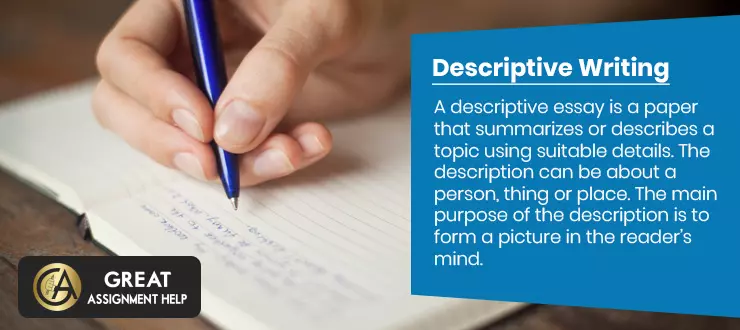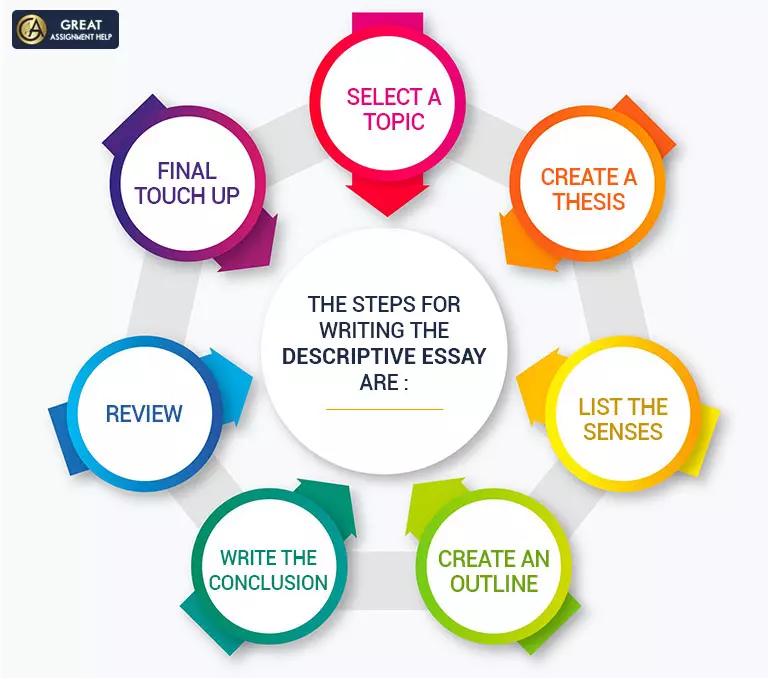Have your teacher asked you to submit a descriptive essay? If yes, then you must have a basic knowledge of descriptive writing to describe your essay topic in a way that is engaging and meaningful to your readers. What is descriptive writing? To know more about the definition of descriptive writing, types of descriptive writing, and characteristics of descriptive writing, continue reading this blog post. Also, from here, learn how to write an outstanding descriptive essay.
Definition of Descriptive Essay
A descriptive essay is a kind of essay that summarizes or describes a topic using suitable details. The description can be about a person, event, thing, or place. The ultimate aim of a descriptive essay is to create a picture in the reader’s mind through a detailed description.
Mostly, to enhance the writing skills of students, teachers often ask students to submit a descriptive essay assignment. Moreover, writing descriptive essays regularly will help the students present their thoughts in a manner that is engaging and interesting for the readers.
What is Descriptive Writing?
So, what is descriptive writing? Descriptive writing is a type of writing technique that allows the authors to describe a specific topic in a more detailed, informative, and interesting way. Also, this writing strategy helps the authors to learn new words and improve their vocabulary. Descriptive writing has an appealing structure and exceptional power. It invokes smells, sounds, tastes, and textures.
If you wish to strengthen the reading experience, then while composing your write-up, you can use descriptive writing. Your readers can easily relate to the writing and connect the content by hearing, tasting, and touching.
Especially, by using descriptive writing, you can become a better writer and also write the essay in a way that is more appealing to your readers. This will help your readers to get a clear understanding of the thing you are describing. Most importantly, when describing, use the correct choice of words and describe the topic from your perspective by including your personal experience.
Features of Descriptive Writing
Listed below are the characteristics of descriptive writing.
- Good descriptive writing makes use of sensory details to showcase a picture that is appealing to the readers.
- It uses figurative language like metaphors and analogies to make the picture clear to readers.
- This uses specific adjectives, and nouns to render life to the picture to set up in the reader’s mind.
- It should be organized using the physical description, feelings, actions, and thoughts of the person.
- This should be concrete, evocative, and plausible.
Types of Descriptive Writing
The following are the different types of descriptive writing.
- Writing about self: This involves writing about My favorite holiday destination, My school, etc. The writer describes himself by writing a story on how things affect him.
- Writing about others: This includes articles like My Father, My Favorite Teacher, etc. The writer should be successful in creating a picture of the person in the audience’s mind.
- Any memory or experience: This involves recalling any memory or any visit to your favorite place. He has to describe any past event.
Various Descriptive Writing Techniques
Listed below are some effective descriptive writing techniques that you can follow.
- Brainstorming ideas: Think about some brainstorming ideas before writing the essay. If you are writing about bread, start by writing a few words like double bread, brown bread, and white bread. Compile a list for each.
- Use precise and succinct language: Make the right choice of words that are relevant to your topic.
- Choose expressive language: Choose the language that serves the user’s purpose. Use ‘reminiscence’ in place of ‘memory’, and ‘leisurely’ in place of slow. Such words make a firm vision in the reader’s mind. While describing, make the thing captivating.
- Make a clear impression: Make a clear impact and an intense sense of appreciation and familiarity in the reader.
- Be cognizant: Don’t fall into a trap of emotions. Have logical support for any argument to convince the readers.
Related post: A Look at the Benefits of Creative Writing Exercises
What is the Purpose of Descriptive Writing?
The primary goal of descriptive writing is to describe something with the help of writing skills. Unlike short stories or reports, a descriptive form of composition gives readers a complete mental image of an imagined or actual situation through the writer’s pen. Here, let us look at the main purpose of descriptive writing:
- Develops writing structure: Descriptive writing aids in the detailed and organized writing of paragraphs and essays. By practicing writing such types of articles, you may learn how to maintain writing balance and gain an understanding of what should be elaborated and what shouldn’t.
- Holds readers’ attention: A strong descriptive essay helps capture readers’ interest and maintain it for an extended period. This means that your reader will continue to be drawn into your writing. A well-written piece is the greatest recommendation for any writer. Therefore, the greatest method to see oneself as an excellent writer is to improve your descriptive writing abilities.
- Improves vocabulary: If you are poor in vocabulary or find it tough to write because you are short on new terms, the easiest method to overcome this is to practice descriptive writing. It effectively helps you locate new words and increases your vocabulary.
- Sharpens descriptive skills: Descriptive writing may be quite useful for conveying a comprehensive understanding of any topic or circumstance. It describes everything minutely, therefore the more explanation you supply, the clearer it becomes.
- Presents sensory details accurately: Descriptive writing will teach you how to express sensory details. The use of sensory details aids in conveying the main theme of your writing. Those who want to be novelists or writers might greatly benefit from descriptive writing.
Examples of Descriptive Writing
For your better understanding, here, we have shared a few descriptive writing examples and descriptive essay topics
- Describe the Castle at Vincennes
- The Life of Princess Diana
- The Hot Fudge Sundae
- A trauma or happiness
- Describe the Beauty of Niagara Falls
- The Great Himalaya Mountain Range
- An event that changed your life
- Description of your childhood memories
When it comes to writing a descriptive essay, always remember that your topic should include elements that may be expressed fluently and elicit some form of emotion in the readers’ minds.
Understand How to Write a Descriptive Essay
The key to writing a descriptive essay is to form a picture in the reader’s mind by involving all five senses- smell, taste, sound, touch, and sight. As a writer, you will have to accomplish all these things to come up with a successful descriptive essay.
If you are asked to write a descriptive essay, make sure to execute the steps that are presented below.
Choose a Topic
This essay focuses on an event, person, place, or thing. While writing, the author has to make sure that he conveys the concept of the topic by describing the things in detail that make an impact on the reader’s mind. Demonstrate the things by showing the picture in the reader’s view carefully. Your essay has to make sense by describing the events in paragraphs in chronological order. The introductory paragraph should build a tone to set all the ideas you may cover later.
Read more topic: Thought-Provoking Argumentative Essay Topics for You to Explore
Identify the Thesis Statement
Find a thesis statement to establish the purpose of the essay. This will regulate the flow of the essay through which the message is conveyed to the readers. This idea will set the essay structure while writing.
List the senses
Create columns for describing the five senses. These designed columns will help you to analyze your thoughts as you describe the topic. Mention any feeling or sensation that you came across while writing. The author should provide all the sensory details to support the thesis statement. You can make use of tools like personification, similes, and metaphors. After preparing the columns, you have to store the information that supports your thesis. You will note these details to put into the paragraph.
Sketch an Outline
Draft a well-structured essay outline by including the essential components such as the introduction, body, and conclusion.
Develop the Essay
Next, with the support of the prepared outline, create an excellent descriptive essay as per the university guidelines. The essay should explain the thesis statement with valid arguments and supporting evidence. Particularly, in the conclusion section, summarize the entire essay and reconfirm your thesis. Note that, the conclusion should be written attractively so that your readers will remember the discussed points for a long time.
Review
After writing the essay, take a short break to clear your mind. It is time to look back into the essay after a fresh and read it in the way, the audience will perceive it. Read the entire essay keeping the reader in mind. Think, if the paper makes sense to you. Does any paragraph need to be rephrased or corrected? The choice of words will determine the author’s view and personality. The details you mention should give the readers adequate information to establish a whole picture. Proofread the entire essay again and again. Allow your friends and colleagues to read it and be ready for any criticism and feedback.
Proofread
Check for any spelling mistakes, grammar, and punctuation. Rectify your mistakes. Rewrite the things that do not make any sense. Make sure that the final product is ready to publish. Analyze the things that need to be reworked.
Wrapping Up
By now, you will have received a better comprehension of what descriptive writing means. If you have a clear idea about descriptive writing, then it might not be challenging for you to compose a descriptive essay. To prepare a great descriptive essay, you may very well follow the tips and techniques suggested above. In case, you are still unsure how to draft an outstanding descriptive essay, get in touch with us. Our team contains skilled essay writers with strong knowledge of different subjects. As per your essay writing guidelines, our team of essay helpers will guide you in crafting a brilliant descriptive essay worthy of an A+ grade.




